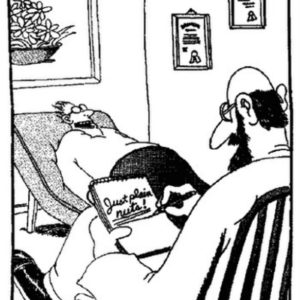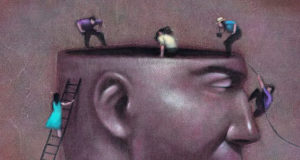Freud’s Psychoanalysis: Is It Time We Moved On?
Psychiatry’s Relationship to Psychoanalysis
I can’t get away from it. I see them everywhere. The four-eyed doctors sitting with analytical cruelty behind a one-dimensional interpretation of reality that I see as senseless. There she is. As I exit the Mount Kisco Greek diner she’s sitting there proud and straight-backed, robotic and brainwashed. It’s Dr. Innez. And across the table of pancakes and breakfast sausages sits another one just like her—the psychiatrists of our Westchester medical universe. Both of whom are probably making connections that make no sense in the real world where I live, but in the scrutinizing world where they live. They foolishly believe they know just what the only reality is, the way it actually is, through their outdated psychoanalysis.
My personal experience has given me insight into the psychiatric institution on a grand scale. An entire “science” has stemmed from the attempt to answer this question: “Why are people abnormal?” At psychiatry’s onset, the problem did not arise from the question. The problem arose from the fact that only a small population of the world was allowed to answer it—namely, white European males. And its philosophy is much stranger and darker than you think, existing inside the long, winding corridors of a weirdo’s imagination. And that weirdo is Freud.
Austrian psychiatrist, Sigmund Freud, is considered the father of psychoanalysis, and his theories fueled philosophical ideologies for over a century. Freud’s psychology heralds itself as the most influential psychological study of all time. His writings have been given over the years sacred status. But his philosophies resemble more of a cult than a continually developing scientific program.
His theories are grand delusional nursery rhyme fantasies that created a pseudoscience at best. And our society’s current psychiatric institution seems more like some perverse expression of a Freudian fantasy gone too far. It’s clear we’re stuck in the head of Freud down here, and I can’t see much in this deep, subterranean unconscious. There’s basically very few colorful choices leading to new theory, and that’s a problem.
Freud influences the field of psychiatry to such a great extent that tens of thousands of people are addicted to their psychoanalyst’s interpretations of their lives. One can argue that the field of psychiatry has become a form of a police state, exercising control over a certain expressive sect of the population, and within its techniques lies psychoanalysis, which has become a central vehicle for the power over our minds. In addition, its methods are also reminiscent of the confessional techniques resembling that of the Catholic Christian tradition, where the guilt is so overwhelming that one must succumb to his lack of self-love and self-esteem in a private setting with a sacred mediator.
Many have argued that Freud set back the study of psychology and psychiatry by over fifty years, and in doing so, he has created a whole sect of patients who have become disabled in depending on themselves to make meaning of their own lives, and instead, depend on their psychoanalyst to interpret their reality for them. In my own experience, it didn’t make sense that the psychoanalysts should be so sure about the inner space of my psyche, as if they could peer inside my mind and see its deep-rooted, unconscious, repressed neuroses doing a dance. But psychoanalysis encourages this very idea—that someone else can interpret your mind for you.
The psychiatric institution is encouraging our society to embrace a psychology that fosters dependence and invokes disability in directing the course of our own lives, which is as outdated and old-fashioned as bustles and corsets.
Freud’s Philosophy
After one’s outpatient visit from a psychiatric hospital, a treatment plan is offered, which pairs talk therapy with medication. Talk therapy, which is often psychoanalysis, is typically the only prescription (along with meds) for a person suffering with mental illness. But while psychotherapy is widely considered the most necessary of all mental health options, it can ironically be debilitating mentally. Opening up one’s stories of private mental distress to dispassionate questions about one’s psyche does not heal a vulnerable mental state.
In Freudian psychoanalysis, the patient verbally expresses his or her thoughts to the analyst who then can infer the unconscious conflicts causing the patient’s symptoms and character problems. As he interprets these conflicts for the patient, the analyst is thought to help create insight for the resolution of the problem and clarify the patient’s pathological defenses, wishes and guilt. But they arrive at this “clarity” by spending their time interpreting the nuances of a person’s communication by way of suspicion. Psychoanalysis searches for deception in language, and thereby destabilizes our natural reliance on clear, obvious meanings. For example, Freud encouraged the method of “free association” to infer the unconscious content of the patients’ wishes and dreams. This method encourages patients to talk freely about a prompt, without censorship or inhibition, about whatever ideas or memories occur to them.
The first time I entered a mental hospital I was given a test based on Freud’s free association theory that apparently measured, so they said, my mental development and neurosis at the time. I was given a wide variety of pictures and told to say the first thing that came to mind. But at the time, I had just recently had a life-threatening experience in suffering from dysentery in India, which was clearly influencing my answers, and which seemed to them exaggerated and lacking a sound interpretation of reality. In this test they encouraged me to report my thoughts and feelings without hesitation and make no attempt to concentrate or think over my answer before doing so. This puts the entire control of healing into the hands of the psychoanalyst who is expected to determine—using a miniscule amount of information—the patient’s mental and emotional problems. And yet the answers to the test were regarded as “proof” of my emotional immaturity and are in my psychiatric records forevermore for any therapist to gaze upon in further analysis.
Psychoanalysis believes that a person’s development is most often determined by forgotten events or figures in early childhood that lay in the unconscious. While this can be seen in some people’s experience with dysfunction in their family ties, a great many people have had very healthy relations with their families and to say something is inherently in one’s unconscious psyche when it is not is a form of mind control. In my years of psychotherapy, I was encouraged to keep analyzing my familial conflicts and how they got buried in my unconscious no matter what the subject, as they ignored more relevant topics—especially that of India. I was always asked about my mother and father and about what they did to me, and even when I couldn’t think of anything that was a sufficient answer, I was told to consider such connections before my next session like a homework assignment. Frequently, patients get locked into this kind of therapy for years and even decades trying to work on familial issues that should have been long forgotten and let go of by early adulthood.
Psychoanalysis also purports that human attitude, mannerism, experience, and thought is largely influenced by irrational drives that are rooted in the unconscious. And it relies on the concept that only after having a cathartic experience under the help of a psychoanalyst can a person be assisted in recovery. Again creating dependence upon psychoanalysis and the drugs that go with it. If we give ourselves power to analyze our own shortcomings and develop personal plans on how to overcome our mental strain, we see that much control is inherent within conscious territory, not wandering forever in our unconscious whereby only a psychoanalyst can break us free from our irrationality.
In psychoanalysis, proponents believe it is necessary for patients to avoid psychological resistance in the form of defense mechanisms when bringing drives into awareness under a therapeutic setting. This approach usually results in the patient’s submissive deferring to the psychoanalyst on any matter. In states of mental vulnerability, suggestions by therapists can be taken seriously by the patient as though they are the primary reasons for our emotional and mental shifts. We accept their analysis of ourselves as more valid than our own, and thus, allow them to direct our actions and thoughts.

Fantasy or Fact?
As psychiatry’s relationship with psychoanalysis thrived throughout the decades, it continued to see itself as a real science—the saddest attempt I ever did see. Psychoanalysis’ usefulness has not been demonstrated through empirical science. Many critics of Freud regard him as making unscientific claims in his writing. His theories are largely incompatible with scientific approaches to the study of the mind. They are almost exclusively based on the clinical case study method, and not on quantitative and experimental research. He used a very limited and unrepresentative sample of patient cases—almost exclusively upper-class Austrian women of the late 19th century—which is not an efficient representative group, and therefore, his theories should not be placed as proven to the general populace. Further, many people I personally know who went through the psychoanalytic process have not resolved the conflicts that are in fact affecting their lives, and are often convinced that psychoanalysis was expensive and a waste of their time.
Naturally, Freud is best known for his Oedipus complex, in which in the phallic stage, a boy’s decisive psychosexual experience is in his son–father competition for possession of his mother. Freud tells us that much of this desire is in the unconscious sometimes shown in dreams. In his book, The Interpretation of Dreams, first published in 1899, Freud gives detailed interpretations of his own and his patients’ dreams in terms of wish-fulfillments. He believed dreams can be effectively analyzed to reveal unconscious material about subjects related to repression, which underlay symptom formation. Based on his case-studies, he would sometimes come across the Oedipus complex and believed that it was the source of much unconscious guilt. But he announced that the oedipal desire was universally innate to all human beings. Psychologist Steven Pinker wrote that “The idea that boys want to sleep with their mothers strikes most men as the silliest thing they have ever heard. Obviously, it did not seem so to Freud, who wrote that as a boy he once had an erotic reaction to watching his mother dressing.”
Scientific surveys have concluded that while personality traits corresponding to Freud’s oral, anal, Oedipal, and genital phases can be observed, they do not necessarily manifest as stages in the development of all children. Let’s be honest here. Freud, who in fantasizing about fucking his mother, came up with an entire philosophy that ‘proves’ his theories and ended up convincing everyone that every human being must be afflicted with the same neurosis.

A Misogynistic Point of View
Further, Freud’s misogynistic point of view considered a girl’s negative Oedipus complex to be possibly more emotionally intense than that of a boy, which would result in a woman with a submissive and insecure personality. Or it could lead to a phallic stage fixation, or penis envy, or may lead to a girl who continually strives to dominate men. Or possibly result in an unusually seductive woman with high self-esteem or an unusually submissive woman with low self-esteem. He basically covers the whole gamut of women’s personalities, calling them all neurotic and mentally ill.
These theories were put forth in a period where women had no say in anything and were highly persuaded on such matters with little freedom to choose an alternative explanation about their own mental and emotional states of mind. Madness and neurosis were prevalent during their day when deep recesses of the mind were being explored. It was a time of psychological darkness and mental and emotional oppression, as there were no choices, no options outside of what those privileged white men were deciding was the norm for every person on Earth where answers about the mind were concerned.
The time period imposed rigid confines on society, and the stifling social values were impossible to uphold. During an age that repressed people’s creativity and aspirations, both England and America were rampant with melancholia. Many were women. This was largely because their potential at the time was so suppressed, that they frequently coped through shutting down and de-pressing their spirits. They were stifled into sexual hysteria, severe anxiety, and depression. Further, there were many who suffered bouts with madness such as in novels like Emily Bronte’s Jane Eyre, where the crazy wife is locked in the attic, or in Elizabeth Gillman’s The Yellow Wallpaper, which portrays the woman expected by her husband to sit in her room all day, every day, until she got magically lost in the designs on the wall.
During this same time period in Europe, Sigmund Freud’s work in psychology grew in high regard. He viewed sanity as proper adjustment to social norms, however unfair, and considered insanity as a state that showed struggle and confusion in the psyche—a reality that is often a prerequisite of true awakening. Freud was from the powerful and privileged social class with access to the best schooling who regarded their own perverted interpretation of reality as absolute fact. He took his limited observations from his patients—a very small population of his own “kind” and mostly women—and projected it onto the general population of society. His brilliant “penis envy” concept is ridiculously still taken seriously in some academic circles, yet he only came up with it because he was visited by all the Austrian women in town of high upper class society who had no way of exercising their own power with their misogynist husbands. He believed he could accurately understand the psychological realities of all others alive based on his philosophy alone, which was saturated in a misogynistic point of view. And yet, Freud flourished and became highly regarded as a man with the answers regarding states of mental illness from only a relative subjective perspective.

A Therapeutic Setting
By no means am I claiming that therapy isn’t useful or therapeutic. But when entering a space when looking for aid in settling the mind’s mental strain, one needs to be careful when choosing a therapist and psychiatrist because in the end, they are dancing within a very personal territory and can harm such a private realm, which contain one’s personal thoughts and feelings.
Currently, I have a helluva good psychiatrist who doesn’t expect me to prattle on blaming my neurotic parents or overanalyze current neuroses or painful stories, but rather asks intelligent questions throughout the session that directly link to the healing process in helping me through painful times to help me get on my own two feet again. He got to know me over the years as a person with goals and dreams that are reachable and real, not as a mental patient who is only motivated by unattainable wish fulfillment.
Psychiatry needs to operate within respectful parameters. Mentally ill patients no doubt need assistance, but other than psychoanalysis, part of any treatment regimen should include a plan for changes in lifestyle or a renewed personal philosophy that can only be created by the patient herself. A patient should feel safe under a therapeutic setting—not overanalyzed—whereby she can enter a space where she can heal in a more compassionate environment. And psychiatry owes that to its patients if it positions itself as an institution that truly exists for healing.

